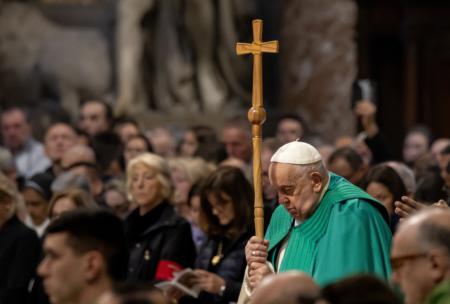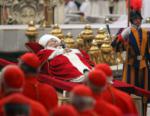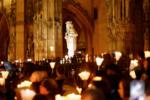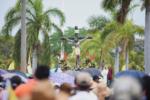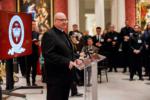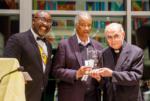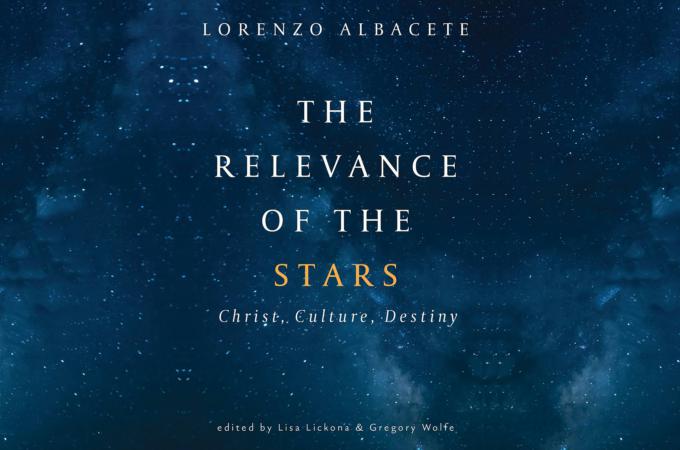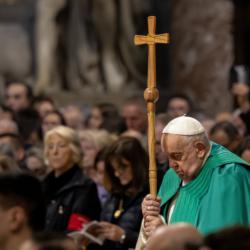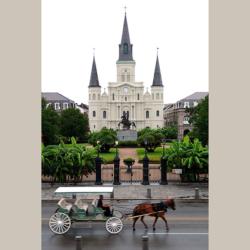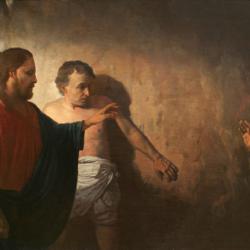'The Relevance of the Stars' explores writings of Msgr. Lorenzo Albacete
The Puerto Rican-born priest and physicist Msgr. Lorenzo Albacete, affectionately known as the "mystical monsignor," didn't quite plan on becoming one of the most highly demanded commentators on religion. Known for his witty sense of humor and profound insights into the human experience, Msgr. Albacete was first "discovered" by the secular media by chance at a dinner party hosted by the liberal journal The New Republic.
One of the attendees, the then-The New Yorker editor Hendrik Hertzberg, was so amazed by Msgr. Albacete that he asked him to write a cover story on Pope John Paul II. The rest was history.
Since then, the unpredictable and unconventional monsignor has made appearances on "The Charlie Rose Show," and had a longstanding column in The New York Times. Using both his larger-than-life sense of humor and immense intellectual acumen, Msgr. Albacete's musings would range from the mystical implications of eating pizza and smoking cigarettes (he was known for walking into class lectures with a donut in one hand, cigarette in the other, and crumbs all over his shirt), to the connection between Christ and cultural phenomena as mundane as "I Love Lucy" and as grave as 9/11.
Whether it was in the pulpit, in his classroom at the John Paul II Institute in Washington, D.C., or at a lavish dinner party with secular journalists and artists, Msgr. Albacete's presence had the power to fascinate whoever was in front of him.
After his passing in 2014, many of those whose lives he touched have worked to systematically organize his legacy. This mammoth task has consisted of reading through his numerous writings, including those published in newspapers and magazines, his bestselling book "God at the Ritz," and the numerous paper napkins on which he scribbled notes. There's also a wealth of video recordings of his appearances on news programs and less formal presentations and conversations (which have most recently been compiled in a documentary screened at the 2021 New York Encounter), and a plethora of anecdotes that his friends and students can recount.
Gregory Wolfe and Lisa Lickona, a friend and a former student of Msgr. Albacete's, respectively, have recently taken on the task of compiling some of the monsignor's most essential writings that have yet to be published. The essays in "The Relevance of the Stars," published by Slant Books, range from speeches he gave to Catholic doctors and lawyers, to essays published on religious freedom, sexuality, and American politics.
The common thread uniting this diverse collection is the relationship between the human person and the symbol of the stars. For Msgr. Albacete, if Christianity is not presented in a way that speaks to the human heart's desire for infinity, it will be rendered useless and uninteresting.
His understanding of Christianity begins with the "religious sense," a concept he borrows from Luigi Giussani, the founder of the Communion and Liberation lay movement, in which Msgr. Albacete was involved since the mid-90s. All humans, no matter when or where they were born or what they look like, possess a never-ending desire for truth, beauty, justice, and love. The most destructive thing a person or society can do is to censor these desires, or settle for finite answers.
What emerges from this series of essays is the conviction that the essence of Christianity is the incarnation of the infinite within the finite realm. The encounter with Christ's presence makes the possibility of fulfillment a tangible reality.
These two points about the religious sense and the encounter with Christ illumine Msgr. Albacete's entry into Christianity's relationship with culture. He writes that culture itself is an expression of the religious sense, it is "the human impulse to relate the particular to the total in order to discover the ultimate sense or meaning of individual experiences."
Evangelization of culture can "only occur through an education of the religious sense." Evangelization presented as a discourse, rather than as a living witness of someone who recognizes Christ to be the fulfillment of the religious sense, lacks the power "to really change the culture."
Msgr. Albacete refused to accept what he viewed as reduced forms of Christianity. The most commonly criticized are intellectualism, sentimentalism, and moralism, or legalism -- often put to the service of political ideologies, left or right. As soon as Christianity is severed from the event of Christ -- the infinite itself -- becoming physically present in the world, it will be unable to contribute to culture.
In several of the essays, Msgr. Albacete posits that "dualism" is the culprit of these "reduced versions" of Christianity in the American context. He attributes this split between the flesh and spirit, community and the individual, God and the world, to the puritanical Protestant forms of Christianity that played a key role in the formation of American culture, as well as to the Enlightenment philosophy it engendered.
Father Peter John Cameron, OP, remembers attending a religious rally in New York City with Msgr. Albacete, when a passerby asked, "Is this a protest?" To which Msgr. Albacete replied, "Yes!"
"What are you protesting?"
"Dualism!"
As the person started running away, Msgr. Albacete shouted, "Don't go! The dualists will get you!"
His writings make reference to other American authors like Flannery O'Connor and Walker Percy, who shared his mission to protest against American dualism.
These insights into American dualism were born from his experience working at a physics lab, where his colleagues questioned, "how was it that I could follow the scientific investigation of life with apparent interest and dedication and, at the same time, believe that a man who was dead popped out of the tomb two-and-a-half days later?"
"You must be two different people," they said, "or one or the other is not true. These two dedications of the heart are incompatible."
His conversations with his fellow physicists compelled him to delve deeper into his beliefs, both on the level of intellectual inquiry and personal experience. "My awareness of this destructive, crippling, and mentally pathological dualism -- because it is true that you cannot be two things that are radically opposed -- forced me to seek an answer to my colleagues' question. I understood that what they were bringing up is a conflict between two cultures -- the scientific culture, with its distinctive logos, and that of the faith, with its own rationality. I became interested in the question of faith and culture."
The chapter on 9/11 offers one of the most profound reflections on the effects of dualism, in which he challenges the idea that the violence of the terrorists was not motivated by "true" religious zeal. "From the first moment I looked into that horror on September 11th, into that fireball, that explosion of horror, I recognized ... religion." Contrary to the belief that religion and violence are motivated by two distinct impulses, Msgr. Albacete claimed that the religious impulse is capable of giving way to both extraordinary gestures of love and extraordinary acts of violence. What they have in common is the thirst for the infinite ... the events of 9/11 being inspired by a "bad infinity."
The chapters addressed to Catholic lawyers and doctors offer more practical insights into overcoming the dualist spirit in the workplace. Many people view spirituality as something separate from one's job, or as something that has to be "added on" from outside. Instead, "work itself is a spiritual act." Msgr. Albacete points to the primordial origins of human labor as part of our identity as co-creators called to collaborate with God's work of creating.
Though Msgr. Albacete's writing is chock full of light-hearted, witty anecdotes, it can quickly turn toward highly intricate intellectual musings. Luckily, Lickona and Wolfe's choice, editing, and ordering of the essays will enable readers to enter more easily in the elaborate mansion of Msgr. Albacete's genius. This collection will help committed Catholics to move beyond a position of merely "dealing" with an increasingly secular culture, and to "get our hands dirty," as Pope Francis would say, and enter into and engage with it head on. The collection will also speak to curious skeptics, who doubt or have no faith at all, but who share Msgr. Albacete's thirst for "more." For what's most attractive about this collection of writings is not just his exceptional intellectual abilities or cultural sensibility, but his larger-than-life and profoundly human love affair with reality and its maker.
STEPHEN G. ADUBATO STUDIED MORAL THEOLOGY AT SETON HALL UNIVERSITY AND CURRENTLY TEACHES RELIGION AND PHILOSOPHY AT ST. BENEDICT'S PREP IN NEWARK, N.J.
